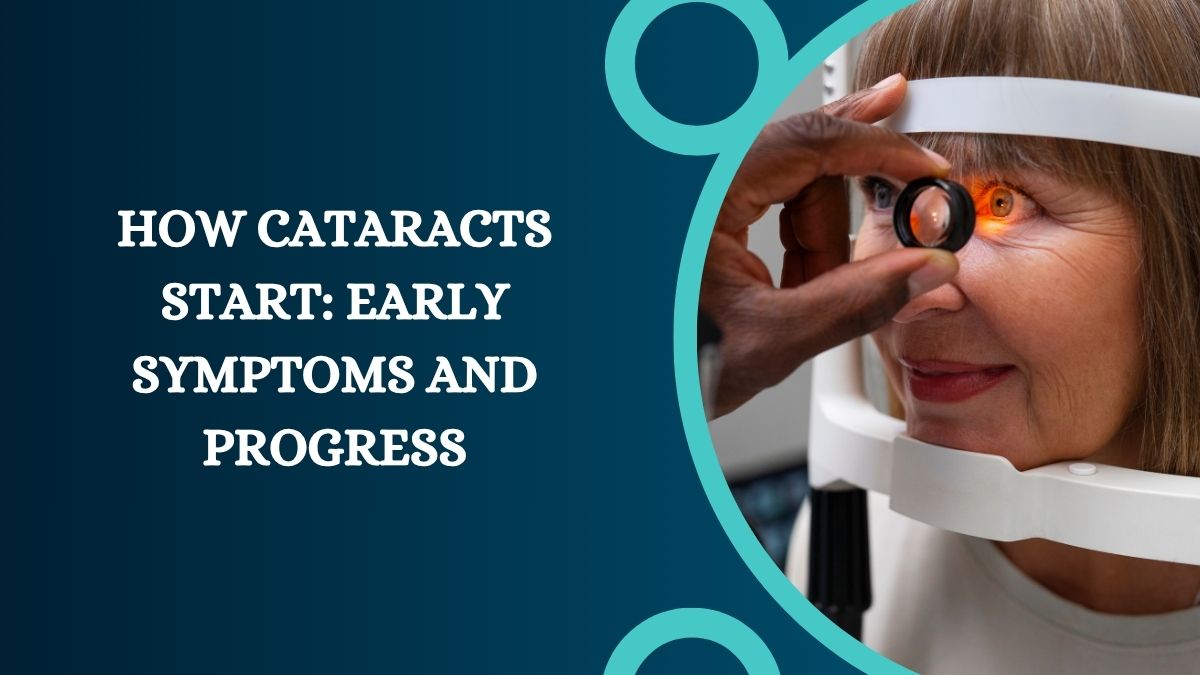How Cataracts Start: Early Symptoms and Progress

Vision is one of our most precious senses, yet many people are unaware of how silently and gradually cataracts can rob them of it. Often mistaken for normal age-related changes, cataracts develop slowly and painlessly, making it easy to overlook the early signs. If left untreated, they can significantly impact your daily life. Understanding the early symptoms and progression of cataracts is the first step toward protecting your vision.
Let’s explore how cataracts develop, the signs you should watch for, and when to consult the best cataract surgeon in Delhi for expert care.
What Is a Cataract?
A cataract is the clouding of the eye’s natural lens, which lies behind the iris and the pupil. This lens is responsible for focusing light onto the retina so you can see clearly. Over time, proteins in the lens break down and clump together, forming a cloudy area that interferes with vision.
Cataracts are most common in people over the age of 60, but they can also be caused by injury, diabetes, prolonged use of steroids, and excessive exposure to UV rays. The condition affects millions worldwide and is one of the leading causes of vision impairment, especially among the elderly.
The Silent Progression: Early Signs of Cataract
Cataracts don’t appear overnight. They develop gradually, and the symptoms can be subtle in the beginning. Many people continue with daily activities, unaware that their vision is deteriorating. Here are some common early signs:
1. Blurry or Cloudy Vision
The most common early sign of a cataract is blurry vision that feels like you’re looking through a foggy window. This blurriness can come and go and may worsen at night.
2. Sensitivity to Light and Glare
You may start finding bright sunlight or headlights more uncomfortable than before. Glare from lights can become intense, especially during nighttime driving.
3. Frequent Changes in Prescription Glasses
If you notice you need new glasses or contact lenses more often, it could be a sign of a developing cataract.
4. Faded Colors
Colors may start to appear dull or yellowish. This happens as the cataract blocks the natural passage of light, affecting how colors are perceived.
5. Double Vision in One Eye
Experiencing double vision or seeing multiple images with one eye (monocular double vision) is another warning sign of cataracts.
If you’re experiencing any of these symptoms, it’s time to consult an eye specialist. Early diagnosis allows for better monitoring and timely treatment.
Stages of Cataract Development
Cataracts typically go through the following stages:
1. Initial Stage
Mild clouding begins in the lens, often with no noticeable symptoms. This is usually detected during a routine eye exam.
2. Immature Cataract
At this stage, cloudiness becomes more visible. Patients might notice slight vision issues like glare or trouble focusing in low light.
3. Mature Cataract
The lens becomes significantly cloudy. Vision deteriorates, and daily activities like reading or driving become difficult.
4. Hypermature Cataract
This advanced stage involves a hardened or shrunken lens. It may leak proteins, potentially leading to inflammation or glaucoma if left untreated.
When to See a Cataract Surgeon?
You don’t need to wait until your vision is severely impaired to seek treatment. If cataracts begin interfering with your ability to work, drive, or enjoy daily life, it’s time to explore surgical options.
Delhi is home to some of India’s leading eye care professionals. If you’re looking for the best cataract surgeon in Delhi, be sure to choose a specialist with advanced diagnostic tools and extensive experience in cataract removal.
Modern cataract surgery is quick, safe, and effective. It involves removing the clouded lens and replacing it with a clear artificial lens. With the latest advancements like femtosecond laser-assisted surgery, recovery is faster, and visual outcomes are significantly improved.
Don’t Ignore the Signs
Cataracts may be common, but that doesn’t mean they should be ignored. Being aware of the early signs and understanding the stages of development can help you take action before your vision is significantly affected. Regular eye exams are essential, especially after the age of 40.If you suspect any changes in your vision, don’t delay. Schedule a consultation with a cataract surgeon in Delhi who can guide you through the right treatment plan. After all, your eyes deserve the best care, and the right surgeon can help restore clarity to your world.

